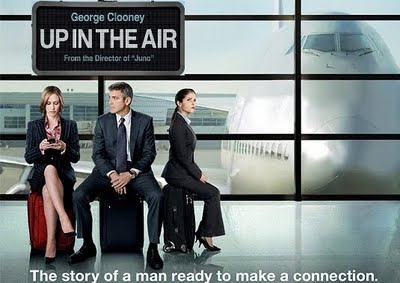"Up in the Air" - Another Hollywood Mindf**k
January 16, 2010

Clooney "hooks up" with "Alex", then falls for her, only to learn that she is married and has a family. That's sacrosanct and he crossed the "no strings attached" line when he showed up at her door with flowers.
But her infidelity, that's not an issue. That doesn't cross any line. The rules have to be observed for hook ups, not for marriages.
Thanks to Hollywood social engineering, feminists like Alex can have prestigious jobs and sleep with whomever, while maintaining an idyllic marriage and family life, just like men.
by Barbara Kay, National Post
U p in the Air is the Rom Com (romantic comedy) of the year. Most critics love it. It's hugely entertaining, but the surprise ending (spoiler alert!) sends a jarring message no reviewer (to my knowledge) has mentioned.
The film is based on Walter Kirn's eponymous 2001 novel about Ryan Bingham, a man who fires people for a living. Ryan spends most of his time on airplanes, travelling to mundane, mid-sized American cities, in each occupying a mundane office cubicle in which he fires mundane workers.
Characterization is dictated by plot. Ryan has a sideline as a charismatic motivational speaker touting the advantages of the untethered life. Successful public speaking is an uncommon achievement, conferring unusual gratification and recognition. How an implausibly urbane man with Ryan's smarts and communication skills can mesmerize audiences, yet find job satisfaction as a faceless nomad, reducing innocent but suddenly expendable people in hard times to emotional rubble in endlessly repetitive, rigidly scripted platitudes is not explained.
"Home" in Omaha is a ruthlessly unadorned studio apartment. Ryan's preferred habitat is any anonymous airport, his great ambition the distinction of joining American Airlines' intimate club of 10-million-mile fliers (he ends up being number 7, and the youngest member).
On one of his downsizing forays, he hooks up with Chicago based Alex, a beautiful, sophisticated frequent-flying female version of himself. Their brisk, mutually straightforward seduction of each other suggests a long history of sexual grazing at the diverse human buffet frequent travel provides.
They continue to hook up when schedules coincide. On impulse after a particularly amorous interlude in another city, Ryan asks Alex to be his date at his niece's wedding in northern Wisconsin. She accepts.
During the wedding weekend, Ryan and Alex seem to connect at a deeper level. He takes her on a nostalgic tour of his former high school. The act of sharing his past opens up a seam of emotional receptivity in him, which Alex in no way resists.
Shortly afterward, succumbing to the neediness the trip home has inspired, Ryan impulsively flies to Chicago to see Alex and declare his feelings. Arriving unexpectedly at her door, he is shocked to hear the sound of children and a husband's voice. Alex's bourgeois family represents her real life, just as airports are Ryan's. He leaves before any damage is done, but she is furious with him for breaking the rules of their ... whatever it is, and for putting her happiness at risk. He meekly accepts her right to be angry. Back to his meaningless life he goes, sadder and not much wiser.
This is where the film lost its appeal for me. Ryan presented honestly as what he was, a single man looking for brief encounters. Alex presented herself as a single woman looking for same. But she wasn't. She was committed -- in her way -- to a family. Ryan wasn't cheating on anyone. She was.
Ryan's crime, in Alex's eyes, was to allow emotion to col-our what was supposed to be a sex-only affair of convenience, the result of which was a near-intrusion into the real life Alex apparently holds sacred.
And yet: A mother of small children with a punishing travel schedule, Alex broke what surely has to be an equally important rule for one playing that game: the rule that says a frequent flyer's rare free time should be spent with one's nuclear family. She took a whole precious weekend -- precious for them, at least -- for an extended sexual fling, cementing the impression that she was single, and allowing Ryan's family to lavish warmth on her as a potential in-law to boot.
Ryan's life is shallow and cyclical. For all his charm, he's a social failure. In the end, he comes to realize that. It is clear he meant to change his ways -- for the better, by accepting responsibilities he had shunned -- if he had committed to Alex.
Alex's life is compartmentalized and cynical. She's an ethical traitor to her family, and has no intention of changing her ways, since there is no hint that she perceives herself to be a moral failure.
In most comedies worthy of the name, even if guy doesn't get girl, some sense of social order and just desserts should prevail. Alex deserved exposure for her multiple duplicities, and Ryan deserved to feel he had been gratuitously humiliated.
Instead, the movie ends with Alex seizing and holding a false moral high ground, with Ryan accepting her judgment of him as a cad for succumbing to a yearning for intimacy. The would-be gentleman is alone and sad. The travel slut is happy and self-righteous. How Rom is that? How Com is that?
bkay@videotron.ca
-----
A blog that reviews Hollywood's Satanic Fare







Morley Evans said (January 17, 2010):
Up in the Air" is not "romantic" and it is not "comic". It is horrifying. The very idea that anyone would consider this movie either romantic or funny (both, you say?) tells us we are in the toilet. The fact that "Up in the Air" is popular, tells us that someone has pulled the chain and flushed the commode. Barbara Kay has written an excellent review of a despicable movie. "Halloween" and "Texas Chainsaw Massacre" are funnier and more romantic.